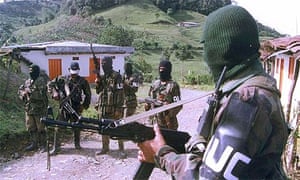Now that a peace deal has been concluded in Colombia, how will justice be meted out to those who committed the most serious crimes during the decades-long FARC revolt? This article suggests that difficult questions remain. Excerpt:
To date, almost 7,800 members of the army have been linked to cases of extrajudicial killing. Only 610 have been convicted.
Under the peace agreement, a Special Jurisdiction for Peace will be responsible for the investigation and prosecution of more than 32,000 cases of atrocities committed by both sides. The tribunal will have exclusive jurisdiction over state agents charged with crimes.
Those who immediately confess will avoid imprisonment and receive alternative sanctions for a period of five to eight years. Those who deny charges against them face imprisonment up to a maximum of 20 years. In comparison, officers and soldiers convicted in Colombia’s national courts have been sentenced to more than 35 years in prison for their involvement in the false-positive scandal.
Richard Dicker, director of the international justice program at Human Rights Watch, explains that “the provisions for penalty in the Special Tribunal are significantly out of line with the way international courts penalize crimes against humanity.”





































